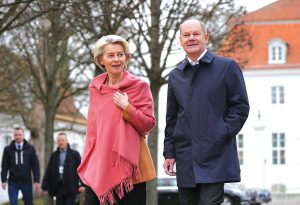BLOOMBERG
German Chancellor Olaf Scholz said talks were constructive with the European Union in resolving a dispute over plans to ban new combustion-engine cars in the bloc from 2035, after Berlin derailed the effort this past week.
Scholz met with European Commission President Ursula von der Leyen on the sidelines of a government retreat in Meseberg north of Berlin. The chancellor expressed optimism a deal could be reached and said discussions would continue in the coming days.
Germany has put pressure on the commission, the EU’s executive arm, to come forward with a proposal that would allow combustion cars running exclusively on so-called e-fuels to continue to be sold after cut-off date.
A final vote on the issue was due to take place on March 7, but was indefinitely delayed amid fears that Germany could abstain, which would torpedo the regulation. “We are in a constructive dialog,†von der Leyen told reporters after the meeting. “We give full support for technological openness, but it must be in line with our goal of climate change.†She added that the discussions were “good and constructive.â€
Decarbonising transport is seen as a key pillar of the EU’s goal to cut emissions by 55% this decade on the way to climate neutrality by 2050. But cars hold outsize importance in Germany, where the auto industry employs about 800,000 people and has revenue of about €411 billion ($437 billion), making it the largest segment of the economy by far.
The intervention by Germany comes at a very late stage of the process — The EU’s 27 member states reached a deal with parliament on the rules in October. Substantial changes to the regulation now would require reopening the file — a process that could take many months and add uncertainty to the outcome.
 The Gulf Time Newspaper One of the finest business newspapers in the UAE brought to you by our professional writers and editors.
The Gulf Time Newspaper One of the finest business newspapers in the UAE brought to you by our professional writers and editors.
